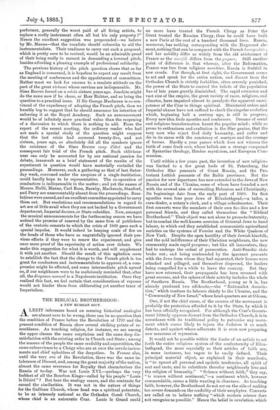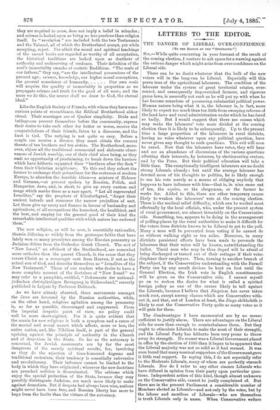THE BIBLICAL BROTHERHOOD :
A NEW RUSSIAN SECT.
ALBEIT inferences based on seeming historical analogies are almost sure to be wrong, there can be no question that the condition of France before the Revolution of 1789 and the present condition of Russia show several striking points of re- semblance. As touching religion, for instance, we see among the upper classes the same scepticism and the same deep dis- satisfaction with the existing order in Church and State ; among the masses of the people the same credulity and superstition, the same subservience to a Clergy who.are at once the servile instru- ments and chief upholders of the despotism. In France also, until the very eve of the Revolution, there was the same in- tolerance of Dissent, and, among the great majority of the nation, almost the same reverence for Royalty that characterises the Russia of to-day. Was not Louis XVI.—perhaps the very feeblest of all the Bourbon Kings—called by his people " Louis le Desire " P But here the analogy ceases, and the contrasts far exceed the similarities. It was not in the nature of things for the Gallican Church, whose head was a spiritual potentate, to be as intensely national as the Orthodox Greek Church, whose chief is an autocratic Czar. Louis le Grand could
no more have treated the French Clergy as Peter the Great treated the Russian Clergy, than he could have built a new Paris at the cost of a hundred thousand lives. Russia, moreover, has nothing corresponding with the Huguenot ele- ment, nothing that can be compared with the French bourgeoisie ; and her nobility differ as widely from the old aristocracy of France as the movjik differs from the paysan. Still another point of difference is, that whereas, after the Reformation, France was free from religious novelties, Russia is fruitful in new creeds. For though, at first sight, the Government seems to act and speak for the entire nation, and dissent from the Orthodox Church is strictly forbidden, often severely punished, the power of the State to control the beliefs of the population has of late years greatly diminished. The rapid extension and vast size of the empire, the great variety of races, religions, and climates, have impaired almost to paralysis the apparent omni- potence of the Czar in things spiritual. Ministerial orders and Imperial ukases have not sufficed to check the singular evolution which, beginning half a century ago, is still in progress. Every new idea finds apostles and confessors. Dreams of social and religious transformation haunt the popular mind ; while so prone to enthusiasm and exaltation is the Slav genius, that the very men who reject God deify humanity, and suffer and die in its cause with the constancy of martyrs and the courage of heroes. Hardly a year passes which does not witness the birth of some fresh sect, whose beliefs are a strange compound of Byzantine theology, Hindoo mystir..ism, and European Com- munism.
Until within a few years past, the invention of new religions was limited to a few great lords of St. Petersburg, the Orthodox Slav peasants of Great Russia, and the Pro- testant Lettish peasants of the Baltic provinces. But the passion for new departures has now extended to the Jews of New Russia and of the Ukraine, some of whom have founded a sect with the avowed aim of reconciling Hebraism and Christianity. Its beginnings date from the early part of 1880. Its first apostles were four poor Jews of Elizabethgrad,—a tailor, a corn-dealer, a notary's clerk, and a village schoolmaster. Their first converts were the members of their own families and a few personal friends, and they called themselves the " Biblical Brotherhood." Their object was not alone to promote fraternity, but to combat the well-known aversion of Oriental Jews to hand labour, to which end they established communistic agricultural societies on the systems of Fourier and the White Quakers of New York. Despite the open hostility of their Jewish kinsfolk, and the cold indifference of their Christian neighbours, the new community made rapid progress ; but like all innovators, they had to undergo the ordeal of persecution. Anti-Semitic riots broke out ; and being confounded by the ignorant peasants with the Jews from whom they had separated, their houses were attacked and pillaged, and themselves dispersed, the leaders being compelled for a while to leave the country. But they have now returned, their propaganda has been resumed with great success, and the sphere of their activity includes the whole of Southern Russia. The Brotherhood, young as it is, has already produced two offshoots,—the "Rationalist Associa- tion," which confines its labours chiefly to the Ukraine, and the " Community of New Israel," whose head-quarters are at Odessa.
One, if not the chief cause, of the success of the movement is probably the protection afforded to it by the State, by which it has been officially recognised. For although the Czar's Govern- ment bitterly opposes dissent from the Orthodox Church, it is in accordance with its traditional policy to patronise any move- ment which seems likely to injure the Judaism it so much detests, and against whose adherents it is even now preparing new measures of repression.
It would not be possible within the limits of an article to set forth the entire religious system of the confraternity of Eliza- bethgrad, the more especially as their articles of faith are, in some instances, too vague to be easily defined. Their principal material object, as explained in their manifesto, is "to uproot all personal and egoistic tendencies, all spirit of sect and caste, and to substitute therefor neighbourly love and the religion of humanity." " Science without faith," they say, " is reason without sentiment,"—a sentiment which, however commendable, seems a little wanting in clearness. As touching faith, however, the Brotherhood do not err on the side of making too severe demands on the credulity of their neophytes. Converts are called on to believe nothing " which modern science does not recognise as possible." Hence the belief in revelation, which they are required to avow, does not imply a belief in miracles ; and science is looked upon as being no less precious than religion itself. In "revelation " are included both the two Testaments and the Talmud, all of which the Brotherhood accept, yet while accepting, reject. For albeit the moral and spiritual teachings of the sacred books are regarded as worthy of all acceptation, the historical traditions are looked upon as destitute of authority and undeserving of credence. Their definition of the soul's immortality smacks of esoteric Buddhism. "The souls of our fathers," they say, "are the intellectual possessions of the present age ; science, knowledge, our higher moral conceptions, the general conscience of humanity Our own souls will acquire the quality of immortality in proportion as we propagate science and truth for the good of all men; and the more we do this, the nearer shall we draw to God, the eternal ideal."
Like the English Society of Friends, with whom they have some curious points of resemblance, the Biblical Brotherhood abhor ritual. Their marriages are of Quaker simplicity. Bride and bridegroom present themselves before the community, express their desire to take each other for better or worse, receive the congratulations of their friends, listen to a discourse, and the knot is tied. The untying is not quite so easy. Before a couple can receive a divorce, they must obtain the consent thereto of ten brothers and ten sisters. The Brotherhood, more- over, abjure all the traditional ceremonial and elaborate obser- vances of Jewish worship, one of their chief aims being, as they omit no opportunity of proclaiming, to break down the barriers which have hitherto separated their "brethren after the flesh" from their Christian neighbours. To this end they exhort the former to exchange their gabardines for the costumes of modern Europe, to abandon the horrible idiom—a mixture of Hebrew and German,—at present spoken by Russian, Polish, and Hungarian Jews, and, in short, to give up every custom and usage which marks them as a race apart. " Let all regenerated Israelites," say the prophets of Elizabethgrad, "forget their ancient hatreds and renounce the narrow prejudices of sect. Let them give up usury and finance in favour of husbandry and agriculture, of all occupations the honestest, the healthiest, and the best, and employ for the general good of their kind the remarkable intellectual qualities with which nature has endowed them."
The new religion, as will be seen, is essentially rationalist, therein differing as widely from the grotesque faiths that have lately won so many proselytes among the Russian peasantry as Judaism differs from the Orthodox Greek Church. The sect of "New Israel," an offshoot of the Brotherhood, are somewhat more orthodox than the parent Church, in the sense that they revere Christ as a messenger sent from Heaven, if not as the actual son of God, and describe themselves as " Israelites of the New Testament." Those of our readers who desire to have a more complete account of the doctrines of "New Israel" we may refer to a pamphlet, entitled, " Dokumente der national- kidischen christglitubigen Bewegung in Siidrussland," recently published in Leipzic by Professor Delitzsch.
As we have already observed, these movements amongst the Jews are favoured by the Russian authorities, while, on the other hand, religious agitation among the peasantry is, as far as possible, discouraged and suppressed. From the imperial despotic point of view, no policy could well be more short-sighted. For it is quite evident that the mania for new religions is both a symptom and a cause of the mental and moral unrest which affects, more or less, the entire nation, and, like Nihilism itself, is part of the general uprising against the principle of authority in the Church and of despotism in the State. So far as the autocracy is concerned, the Jewish movements are by far the most dangerous of the merely spiritual revolts, for, involving as they do the rejection of time-honoured dogmas and traditional restraints, their tendency is essentially subversive and revolutionary. Their influence cannot be limited to the body in which they have originated ; wherever the new doctrines are preached sedition is disseminated. The schisms which enjoy the special protection of the State, because they may possibly disintegrate Judaism, are much more likely to make against despotism. But if despots had always been wise, nations might never have been free, and Russian liberty has more to hope from the faults than the virtues of the autocracy.



































 Previous page
Previous page